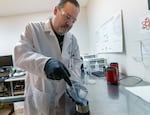Just a few weeks after naming the first licensed psilocybin manufacturer in the state, Oregon has granted a license to a Portland company to test the mushrooms for potency.
In naming Rose City Laboratories the first company to be allowed to do the testing, the Oregon Health Authority said: “Accurate labeling of psilocybin potency allows clients to participate in administration sessions with products that meet their needs.”

Björn Fritzsche, research and development chemist at Rose City Laboratories, explains the testing process for psilocybin mushrooms at the Portland lab, March 17, 2023. Rose City is the first lab in the state to apply for a license and meet Oregon Health Authority requirements for testing the purity and potency of psilocybin mushrooms.
Kristyna Wentz-Graff / OPB
Björn Fritzsche is a chemist with Rose City Labs. He says the company’s years of experience in testing cannabis products will translate easily to this new work.
“The process for the potency testing is surprisingly similar,” Fritzsche says. “The solvents that we use for extraction are a little bit different, but the actual technology that we use — high pressure liquid chromatography — is very similar.”
Still, this is a new frontier in medicine, and Fritzsche is excited about the possibilities.
“I get to do something new, something that hasn’t really been done at scale before,” Fritzsche says. “I was actually able to develop new methodologies, do something that hadn’t been done before. And that’s really interesting.”
Fritzsche spoke with OPB “Morning Edition” host Geoff Norcross:
Geoff Norcross: At the moment, the state will only allow the psilocybe cubensis mushroom as the delivery method for the compound, although that could change someday. So when a licensed manufacturer sends you mushrooms, how do you test them?
Bjorn Fritzsche: “There’s two primary tests that we run. The first one is the speciation where we basically confirm that the mushroom indeed is psilocybe cubensis. It’s done in the form of a DNA test where we extract some DNA out of the mushrooms. And then we use a technology called QPCR to confirm that the DNA matches the type of mushroom that we’re trying to identify.”
Norcross: Do you have to test every mushroom that a manufacturer sends to you?
Fritzsche: “No, we test batches of mushrooms. And specifically for the speciation, manufacturers only have to test their first batch of the year. Once they’ve shown that they’ve grown the correct mushrooms, it’s generally assumed that they will continue to do so.”
Norcross: Are you looking for any dangerous stuff?
Fritzsche: “We do look at products that are made with either methanol or certain acids. We make sure that those are successfully removed from the final product. But that is only applicable to like extracts or concentrates of mushrooms, not to just the fruiting bodies themselves.”
Norcross: Does every mushroom have to have the same amount — or at least a minimum amount — of the psilocybin compound in them?
Fritzsche: “We recommend generally that the manufacturer homogenize their batches currently, meaning they’re grinding it all into a powder. From this powder we take two samples, and those have to have a relative standard deviation of 20% or less. For actual fruiting bodies, we take multiple samples across the batch in different spots and try to create a representative sample. However, there’s no requirement for those different samples to all match up. It’s understood that in a batch of actual fruiting bodies, there’s going to be a certain amount of variation.”
Norcross: You have tested cannabis products for years. How is this process of testing these mushrooms going to be different, if at all?
Fritzsche: “The process for the potency testing is surprisingly similar. It’s just that the compounds that we find in mushrooms are primarily water soluble versus the compounds we find in cannabis are usually only soluble in solvents, like alcohol or in oils. So, the solvents that we use for extraction, et cetera, are a little bit different. But the actual technology that we use — high pressure liquid chromatography — is very similar.”
Norcross: Psilocybin is a controlled substance under federal law. Does that make this work more difficult in any way?
Fritzsche: “It does in certain aspects. Since we also have to obtain standards to calibrate our instruments, and also have to spike certain quality control samples with known amounts of these compounds. And due to them being Schedule 1, we can only obtain them in very small milligram-at-a-time amounts. But so far we have been able to work around that.”
Norcross: Why did your company want to get into the psilocybin testing business?
Fritzsche: “I think it’s a combination of that, we already have lots of experience in the cannabis industry, and it seemed a little bit like the next frontier. In addition to that, the owner of our company, Daniel Huson, is very much into mushroom and mushroom-related healing. So he was personally interested in that.”
Norcross: And what about you? How is this personally meaningful for you, to be right at the beginning of this psilocybin-assisted therapy experiment that’s going on in the state?
Fritzsche: “For me personally, what I found fascinating about it was primarily that I get to do something new, something that hasn’t really been done at scale before. Lots of the tests we do in the environmental lab, even a cannabis lab now, is something that has been standardized, has been done the same way every year after year. With the psilocybin stuff, I was actually able to develop new methodologies, do something that hadn’t been done before. And that’s really interesting. I enjoy that startup environment. I enjoy doing something that hasn’t been done before.”
Click on audio player above to hear the whole conversation.
